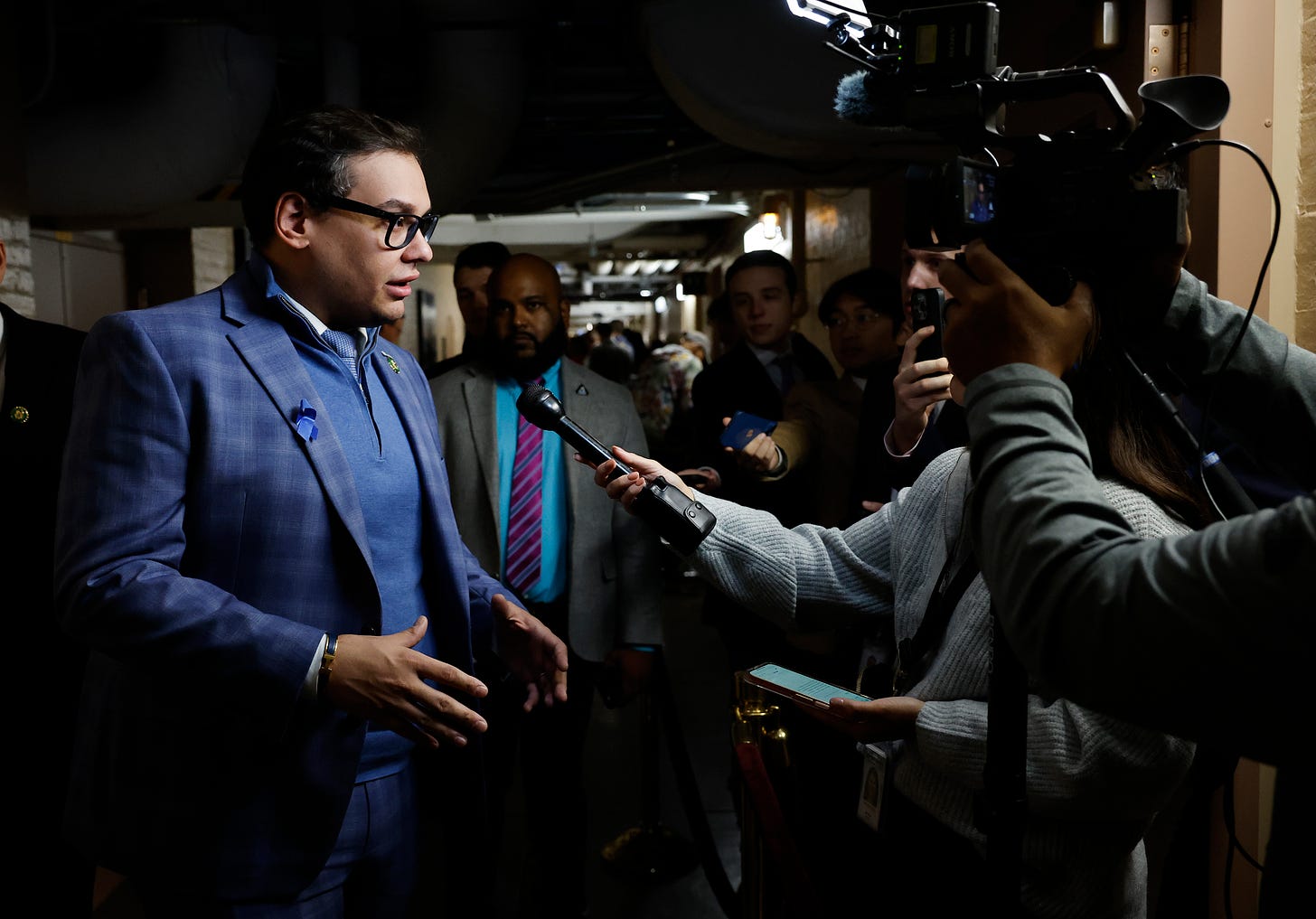The decline of local news gave us the George Santos debacle
Plus, what I'm reading (and trying to write)
Last year, when the Republican fraudster and ne’er-do-well George Santos was running for Congress, local journalism failed to do its duty.
Although a tiny newspaper on Long Island did sound an alarm about this candidate who would turn out to be a one-man horror show of ethics malfeasance, lies and apparent corruption, nobody really listened.
The bigger, more influential news organizations apparently didn’t have the horsepower to do their actual job, which is holding power to account. That used to take the form of scrutinizing the records of candidates and telling the voting public about the findings. That investigative process is sometimes called “scrubbing.”

But Santos went unscrubbed, and thus got elected by the uninformed public.
“When you read about George Santos, be reminded that this is a story of the decline of the local news industry and the accountability function it plays,” wrote Sarabeth Berman, the CEO of the American Journalism Project, which helps fund newer models of local journalism.
That’s part of why I found myself last week at an event in Albany, New York, advocating for New York’s version of the Local Journalism Sustainability Act. Similar to a national proposal, it can be seen as a jobs bill, since it provides a tax credit to news organizations to help pay for the reporters and editors on their staffs.
I’m not comfortable pushing for legislation. Doing so seems outside the bounds of the impartial observer role I prefer to play. I’m a journalist, after all, not a lobbyist. (As an opinion columnist, I do have more leeway; and when I was a member of the editorial board at The Buffalo News, we often advocated for or against legislation, though that was with the paper’s institutional voice, not my personal one.)
But with the decline of local newspapers accelerating, I thought it was necessary to take this stand. Northwestern University released some research last week showing that one third of the U.S. newspapers operating in 2005 will be gone by next year. That’s a year earlier than was previously projected.
“The industry is failing so fast that even hedge funds are pulling back,” wrote Sara Fischer of Axios as she covered the report. “There’s not much juice left to squeeze.”
If you’d like to learn more, you can:
— Watch a video of last week’s panel discussion in Albany, which was done in conjunction with the Newspaper Guild, both the national union and its Albany chapter. There’s a discussion of the possible pitfalls of this bill, as well as its merits.
— Read this related Q&A piece in the Albany Times-Union (whose exemplary editor, Casey Seiler, said he thought the tax credit would allow his paper to add a couple more reporters to its diminished ranks).
— Consult the research from the Medill Local News Initiative at Northwestern University. The research includes some of positive developments in local news as well as the accelerating disaster in the newspaper world.
— Check out my 2020 book, “Ghosting the News: Local Journalism and Crisis of American Democracy.” It’s set partly at The Buffalo News, where I spent 30 years, from summer intern to top editor, and where the newsroom staff has dwindled from 200 to about 70. Regrettably, Warren Buffett sold the paper to the Lee Enterprises chain a few years ago.
On another note, I appreciated your book recommendations. Having recovered from my immersion in “Demon Copperhead,” I’ve read Celeste Ng’s “Our Missing Hearts,” a novel that envisions the kind of authoritarian nation we may be moving toward. I also began “State of Silence,” by the political historian Sam Lebovic, about the Espionage Act and the rise of the American secrecy state.
On the much lighter side, I’ve been reading short stories inspired by Sir Arthur Conan Doyle’s famous detective tales from a 2016 collection called “Echoes of Sherlock Holmes.” Some are pretty good and have prompted me to return to my own stalled experiment in detective fiction. I’ve started a (possible) series starring Gale Force, the nom de plume of a laid-off Buffalo newspaper reporter turned sleuth.

Thanks to all subscribers here for your interest in these subjects which matter so much to our democracy. I’m very grateful.
This post is free to all; paid subscribers are encouraged to participate in the comments section here. Please know that I read every comment and respond to most. What is your source of local news? What do you think is the best way to sustain local journalism?






I worked in newspapers, magazines, radio station newsrooms and websites for 35+ years. I just read this and instantly subscribed at the $50 annual level. I also shared it on social media with this note that I thought you might appreciate...
When I worked at the Kalamazoo Gazette in the late 80s there were 50-60 people in that newsroom—10 city desk reporters, three business writers (I was one), five sports guys, a feature section with full time fine arts, music, health, and TV/movie writers, four photographers…five or six grizzled veterans on the copy desk…and assorted clerks and interns… all of us convinced we were gonna break the next Watergate. Today? I bet there aren’t a dozen people in the MLive.com Kalamazoo newsroom… and I bet they’re almost all recent grads with little to no experience or institutional memory.
That makes it a great time to be a crook at any city, village, or township hall, or school district, in the coverage area. Journalism is vital to keeping American government honest and democracy healthy…and it’s dying. It’s so sick that even the goddamned vulture capitalists in “private equity” are giving up on it. It’s what gives us crooks like Santos. As I’m fond of saying, without reporters with time and resources at the Detroit News and Free Press, Kwame Kilpatrick is still mayor…or worse, in higher office.
What’s the solution? Damifino, but what this column describes is one possible answer. So is making journalism nonprofit, with philanthropic support.
If Trump gets put back in office of course none of this will matter, we’ll be a dictatorship with opposition press jailed or otherwise silenced. But in the meantime, journalism needs support from all of us. I subscribe to several print and digital media outlets. Do you?
If we want a democracy, local (and national) news is an irreplaceable public service, and as the panel at the Albany discussion joked, is also an "unfunded mandate" of the Constitution. A free press will not survive without a solid base of public funding, keeping in mind that this also has its limits (e.g., government propaganda).